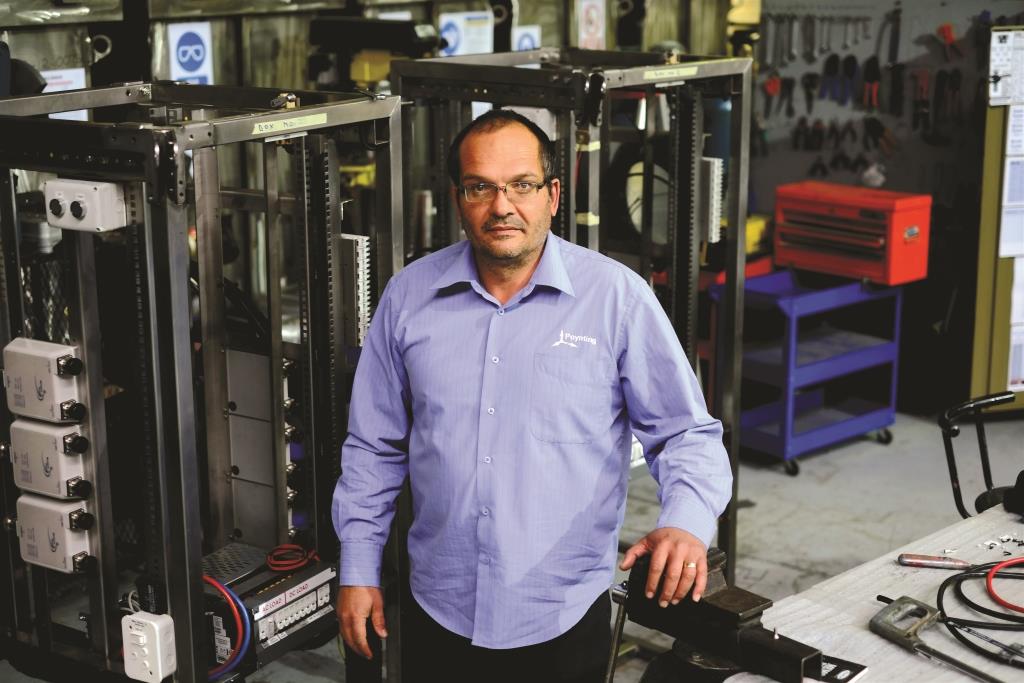Andre Fourie left the lecture rooms and aboratories behind to become the chief executive of Poynting Holdings; the largest wireless antenna designer and manufacturer in South Africa.
Fourie founded his business while he was a lecturer at a university in South Africa. Today, the company focuses on four main technology segments: monitoring and communications antennas, commercial cellular end user antennas for 3G, LTE and WiFi consumer antennas; cellular coverage solutions for operators and cellular infrastructure providers as well as digital television solutions to TV broadcasters.
Since leaving his academic path, Fourie has never looked back. The new path led him to the helm of a R387-million ($33 million) company, as of January, and listed on the Johannesburg Stock Exchange’s AltX board. The AltX provides smaller companies with access to capital while providing investors with exposure to fast-growing smaller companies in a regulated environment. Poynting’s share price is up 82% since 2008.
When he was a boy, Fourie’s father, a bank manager at the time, advised him to never work for a salary.
So, while he was still at school, Fourie would buy old radios, fix and then sell them. It was a skill he learned from his grandfather who was a farmer.
“I grew up in an extremely Afrikaans environment, including the typical army conscription at the time. And there I got advised by a guy, I think I got a very multicultural exposure which I think people missed about the military background that all of us were forced to take. And secondly, he said, ‘You must go to an English university, you can’t be this Afrikaans,’” says Fourie.
With this recommendation, he chose to study at the University of the Witwatersrand (Wits) in Johannesburg.
“It was a strange thing for an Afrikaans boy to do. At that time, they’d just burned the flag [the old South African flag used during apartheid] and that was a wonderful experience for me. It opened my eyes to how well you can do if you mix different cultures together,” he says.
Fourie graduated with a Bachelor of Science degree in engineering.
“Within one year of doing my fourth year, I started lecturing because my lecturer immigrated to the United Kingdom and, at the time, I was the only guy who knew something about antennas; you can imagine not that much,” he says.
He completed his master’s degree and was appointed as a research officer for the engineering department. In 1991, he also decided to work on a PhD in engineering.
“So I started building a research group and in the nineties we formed a company and started with consulting work. The company operated for about 10 years from Wits,” he says.
This company was Givati Fourie and Associates. It invented and designed its own products as well as provided specialized design services to the industry.
In 1996, the company was disbanded and Poynting Innovations was formed, with a similar business model and Fourie as chief executive. Four years later, Fourie says the company wanted to start manufacturing low-cost antennas and so he founded Poynting Antennas. With this, his staff increased from eight to 124 employees.
Though getting his company on its feet was not easy, Fourie got a helping hand from the Industrial Development Corporation (IDC), the Department of Trade and Industry and the military.
“I credit the government for helping to start our business, they really helped us in the beginning,” says Fourie.
Ten years after receiving his PhD, he became an assistant professor but decided he should focus on Poynting fulltime. In 2005, Fourie delivered his last lecture and ended an 18-year university career.
Today, Poynting is a Pretoria-based company with a manufacturing facility in nearby Centurion, where he has a modest office on the ground floor. Their products are aimed at large international military systems integrators and distributors who contribute about 80% to Poynting’s turnover.
In April, the company released good results for six months to December 31, 2013. Its revenue increased by 27.4% to R53.5 million ($5 million) and after-tax profit increased 72.7% from R2.2 million ($200,000) to R3.8 million ($347,000).
The 50-year-old Fourie says the company is positioning itself as a leading player in the triple-play future. This is the convergence of television, voice and the internet on one digital platform.
Poynting acquired 100% of the issued share capital of the Pretoria-based African Union Communications (Aucom) in March for R49.5 million ($4.6 million). It was funded by the issuance of 66 million Poynting shares.
Poynting’s chairman, Coenraad Bester says this is the company’s first major deal since listing and they anticipate that it will more than double its turnover.
The acquisition increases the distribution of Poynting’s digital television products into the African markets.
Aucom works with a lot of broadcasters in Africa, where digital migration is creating a huge demand for solar-powered systems that enables the viewing of new channels on new platforms.
Fourie says the deal will significantly increase the market share of both companies and facilitate the raising of additional capital for the development of projects to meet the needs of the growing African digital television market.
In July, the company acquired two more key acquisitions including Radio Network Solutions (RNS) for R110 million ($10 million). According to Reuters, the deal will be settled by a cash payment of R60 million ($6 million) and the issuance of 18.2 million new Poynting shares at 275 cents each.
The company also acquired Poynting Europe, which distributes the company’s commercial antenna products in Europe. Fourie says these two acquisitions will help turn the company’s fledgling commercial and cellular coverage solution (CSS) divisions to profitability.
Fourie says Poynting remains focused on acquisitions to improve international sales and contribute to the current defence, telecommunications and digital business.
Not bad for an Afrikaans boy who started by selling radios.
